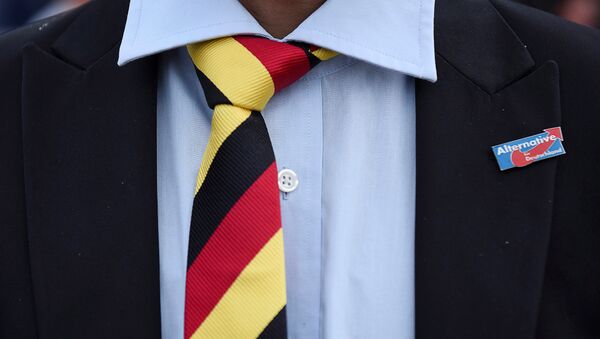"AfD started perfectly. Today it is becoming more and more nationalistic and becoming more and more like SPD," he said in summary.
There are two main reasons why Fiechtner left both the party and its division (faction) in the state parliament (Landtag) in Stuttgart, the capital of Baden-Wurttemberg, last Friday.
"The first one is total neglect of the legal orientation in this faction," says Fiechtner. "My rights were violated in a way that is violation of the Constitution."
The AfD faction in the local legislature banned the lawmaker from delivering speeches several months ago and removed him from all committees. Because of this, he filed a lawsuit in a state constitutional court. Although the court found him right on all points on October 27th, AfD didn't budge.
"Even the court decisions do not matter for them," he said.
For Fiechtner, this was an unequivocal signal to leave the party.
The second reason was the personality of Wolfgang Gedeon, whose anti-Israel and anti-Semitic ideas are unacceptable for Fiechtner. Gedeon left the Landtag's AfD division in 2016, which led to a temporary schism within the faction. However, Gedeon continued to cooperate with AfD as a non-faction representative.
"I observe no separation from Dr. Gedeon," Fiechtner said.
This was the second signal for him.
"This was the end. These were two factors that made my leave inevitable."
AfD — now and before.
For Fiechtner, a state politician and one of the most famous oncologists and palliative care specialists in Baden-Wurttemberg, AfD "initially was a perfect political project" because it united positions that he believed in.
"In particular, those were classical conservativism and a classical civil position. It was what the Christian Democratic Union (CDU) stood for back in the 90's regarding the image of the family, regarding foreign policy or connection to the Fatherland. All that, combined with ideals of freedom of the classic Free Democratic Party (FDP), that is — free market, freedom of deals."
"There was this patriotic tone that I also liked in general," Fiechtner added.
READ MORE: AfD: European Sanctions Against Russia Cost Germany Thousands of Jobs
However, there is a movement within AfD which "underscores the national issue quite strongly."
"So strongly, in fact, that it becomes the foreground. Now, within the framework of migration crisis, this has become an especially accentuated issue. More and more. Then, the nationalist tones emerged, and then the tones praising things related to the Third Reich emerged. These are things that I don't accept and don't want to have any part in."
Gedeon's Issue — Lost Chance or New Beginning?
"I wanted to give this faction one more chance to begin a real restart," Fiechtner says, a "democratic, mildly conservative restart with stark positioning against anti-Semitism. The faction, as expected, declined this offer."
But then on November 21 a scandal broke. AfD faction members filed a request, and Gedeon was included in the faction's "workgroup Europe" the same day. In addition, he filed an application for a federal party convention in Hannover in December along with other state members of AfD.
"I'm anxious," Fiechtner said. "If these applications pass even with the smallest overweight, this will only cement me in my position. I cannot imagine that Gedeon, with his position towards Israel and the Jews, will turn out right. I don't think he will succeed."
Too Much Like SPD?
Almost one year before Fiechtner's resignation, another member, Klaudia Martin, also left the faction. Today she represents CDU, and criticizes the AfD faction's outgoing leader Jörg Meuthen's "right roll."
Other resignations followed, at both the state and federal levels.
"I believe that, while every case was different, most resignations were a matter of content. I assume that they were in some way related to the growing nationalist moment we are seeing."
Fiechtner believes AfD leans too far towards the left.
"AfD shifts more and more towards the political positions of the SPD [German Social Democratic Party]," he said.
This is not surprising, considering the electorate. Many on the left and many former SDU voters voted for AfD.
"They want to be sure to serve this clientele. We do now what we used to criticize: in our political positioning [AfD] seeks to get as many people as possible. Not like before, when we had courage to say the truth, take a position and hold it."
This kind of courage is not so characteristic for the party anymore.
"Anguish Will Cease"
Meuthen, who left the position of state chairman of AfD to serve as a member of the European Parliament, called Fiechtner's decision to quit "consistent, if late."
"This was anguish that now will cease," he said in an interview with DPA.
For the faction, cooperation with Fiechtner during the last year was difficult; his leave will ease tensions within the faction.
Bernd Goegel, Meuthen's successor as AfD state chairman told SWR: "I regret this [Fiechtner's] decision, although we were not always of the same opinion. We will miss him."
Fiechtner plans to restore his right to speak in the Landtag as an independent deputy. After his resignation, there are 20 members that remain in AfD's Stuttgart faction. If one more member leaves the faction, AfD will stop being the most powerful opposition faction. SPD faction has 19 members.
By Alexander Boos.


